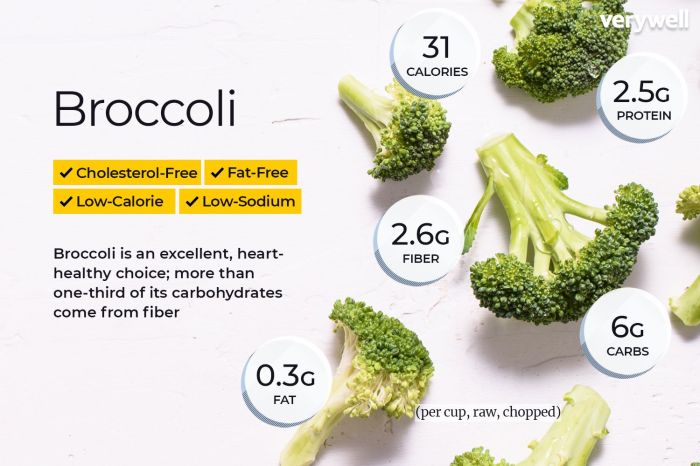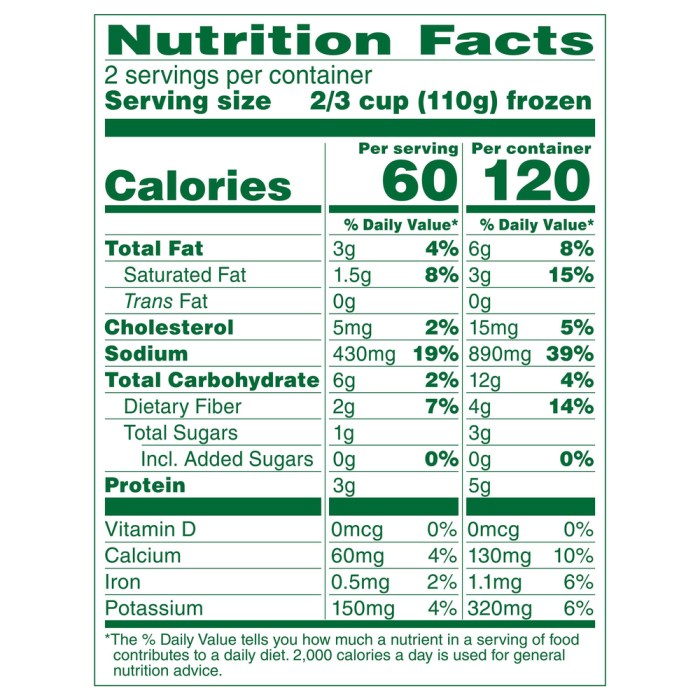Micronutrient Content and Benefits

Broccoli and cheese nutrition facts – Broccoli and cheese, when combined, offer a surprisingly diverse range of essential micronutrients contributing significantly to overall health and well-being. This synergistic pairing provides vitamins, minerals, and phytonutrients that individually and collectively support various bodily functions. Understanding the nutritional contributions of each component allows for a more informed appreciation of their combined health benefits.
Key Vitamins and Minerals in Broccoli and Cheese
The following table details the key vitamins and minerals found in broccoli and cheese, along with their individual and combined health benefits. It’s important to note that the exact nutrient content can vary depending on factors such as the type of cheese and broccoli variety.
| Micronutrient | Broccoli Benefit | Cheese Benefit | Combined Benefit |
|---|---|---|---|
| Vitamin C | Supports immune function, acts as an antioxidant. | Contributes to overall antioxidant capacity, especially when combined with other antioxidants. | Enhanced immune support and improved antioxidant protection against cell damage. |
| Vitamin K | Plays a role in blood clotting and bone health. | Significant source of Vitamin K2, crucial for bone health and cardiovascular function. | Synergistic effect on blood clotting and enhanced bone mineralization. |
| Calcium | Contributes to bone health, though in smaller amounts than cheese. | Essential for strong bones and teeth, muscle function, and nerve transmission. | Significant increase in dietary calcium intake, crucial for skeletal health throughout life. |
| Potassium | Supports healthy blood pressure and fluid balance. | Provides potassium, although the amount varies depending on the type of cheese. | Improved electrolyte balance and potential blood pressure regulation. |
| Vitamin A (as beta-carotene) | Precursor to Vitamin A, important for vision, immune function, and cell growth. | Some cheeses may contain added Vitamin A. | Increased intake of Vitamin A precursors and potential enhancement of vision and immune function. |
Broccoli’s Phytonutrients and Their Effects
Broccoli is rich in phytonutrients, particularly sulforaphane, which are bioactive compounds with potent antioxidant and anti-inflammatory properties. Sulforaphane, for example, has been shown in numerous studies to activate enzymes that detoxify carcinogens and protect cells from damage. This contributes to broccoli’s reputation as a cancer-protective food. These phytonutrients work synergistically with other nutrients to enhance overall health benefits.
The antioxidant properties help combat free radical damage, while the anti-inflammatory effects can reduce inflammation throughout the body.
Calcium’s Role in Bone Health and Vitamin K’s Role in Blood Clotting
Cheese is an excellent source of calcium, a crucial mineral for building and maintaining strong bones. Adequate calcium intake throughout life is essential for preventing osteoporosis and maintaining bone density. Furthermore, vitamin K, particularly vitamin K2, found in some cheeses, plays a vital role in activating proteins necessary for blood clotting. This process is essential for preventing excessive bleeding and maintaining cardiovascular health.
Right, so broccoli and cheese, classic combo, yeah? Looking at the nutritional breakdown, you’ve got your vitamins in the broccoli, but then the cheese adds a hefty dose of fat and sodium. To get a proper picture of that cheese element, check out the kraft american cheese nutrition label ; it’s a bit of a game-changer. Then you can properly compare and contrast, and work out if your broccoli and cheese is a total win or a bit of a nutritional fail.
The combination of calcium from cheese and vitamin K from both broccoli and cheese contributes to improved bone health and blood clotting function.
Broccoli and Cheese Combination: Broccoli And Cheese Nutrition Facts

Broccoli and cheese, a classic pairing enjoyed worldwide, offers a delicious combination of flavors and textures. However, understanding the nutritional implications of this combination is crucial for making informed dietary choices. This section delves into the nutritional synergies and potential drawbacks of consuming broccoli and cheese together, providing a sample recipe and outlining associated health benefits and risks.
Broccoli Cheese Soup Recipe and Nutritional Information, Broccoli and cheese nutrition facts
The following recipe provides nutritional information per serving based on readily available ingredients. Note that nutritional values can vary depending on specific brands and portion sizes.
| Ingredient | Quantity | Nutrient Contribution | Calorie Contribution (approx.) |
|---|---|---|---|
| Broccoli florets | 2 cups (200g) | Vitamins C & K, fiber, folate | 55 |
| Cheddar cheese (shredded) | 1 cup (113g) | Calcium, protein, fat (saturated and unsaturated) | 400 |
| Chicken broth (low sodium) | 1 cup (240ml) | Sodium (low), water | 15 |
| Milk (whole or low-fat) | ½ cup (120ml) | Calcium, protein, fat (depending on milk type) | 60 (whole milk), 30 (low-fat milk) |
| Onion, garlic, butter (optional) | As desired | Flavor enhancement, minor nutritional contribution | Variable |
| Total (per serving, using low-fat milk) | 530 (approx.) |
Nutritional Synergies and Drawbacks
Combining broccoli and cheese presents both nutritional advantages and disadvantages. Broccoli provides essential vitamins, minerals, and fiber, while cheese contributes calcium and protein. However, cheese, particularly cheddar, is relatively high in saturated fat and sodium. The net effect on overall health depends on the quantity consumed and the type of cheese used. For instance, opting for lower-fat cheese options significantly reduces the saturated fat intake.
Similarly, using low-sodium broth helps mitigate the high sodium content often found in processed cheeses. Portion control is key to balancing the benefits and drawbacks.
Health Benefits and Risks of Regular Consumption
Regular consumption of a broccoli and cheese combination can offer several potential health benefits, but also presents some risks.
Potential Benefits:
- Increased calcium intake, supporting bone health.
- Improved protein intake, essential for muscle building and repair.
- Increased vitamin and mineral intake, contributing to overall health and well-being.
- Fiber intake from broccoli aids digestion and promotes satiety.
Potential Risks:
- High saturated fat intake can increase the risk of heart disease if consumed excessively.
- High sodium content can contribute to high blood pressure in susceptible individuals.
- High calorie intake can lead to weight gain if not balanced with overall dietary intake and physical activity.
- Individuals with lactose intolerance may experience digestive discomfort.
FAQ Summary
Is broccoli and cheese a good source of protein?
Yes, together they offer a decent amount of protein, particularly from the cheese. However, it’s not a complete protein source on its own.
Can I eat broccoli and cheese every day?
While not harmful in moderation, daily consumption could lead to high saturated fat and sodium intake if portion sizes aren’t controlled. Variety is key for a balanced diet.
Does broccoli and cheese affect blood sugar levels significantly?
Broccoli has a low glycemic index, while cheese has a moderate one. The combined effect on blood sugar depends on portion sizes and the overall meal composition.
Are there any potential allergic reactions to broccoli and cheese?
Dairy allergies are common concerning cheese. Broccoli allergies are less frequent but possible. Always be mindful of potential allergies.






